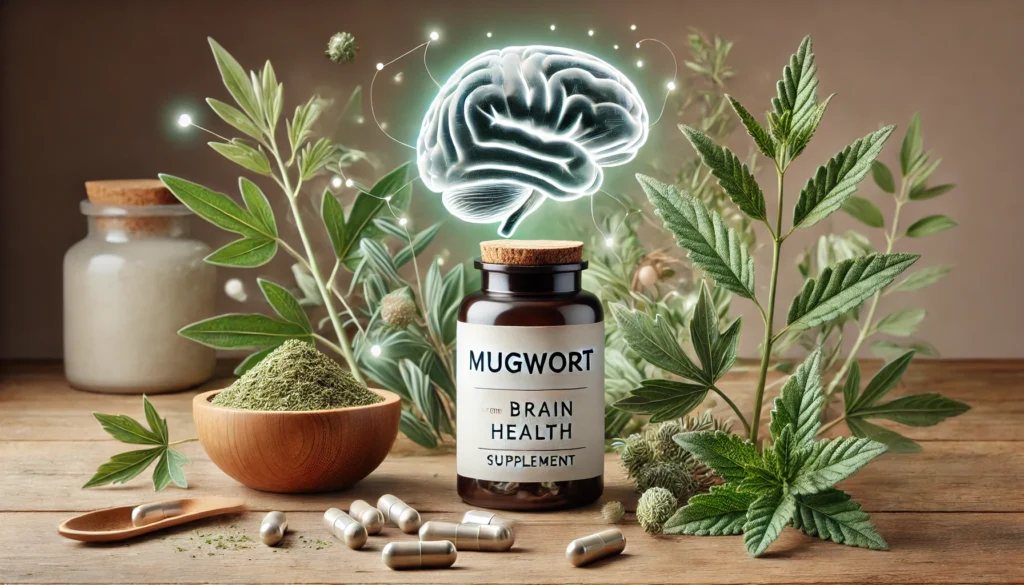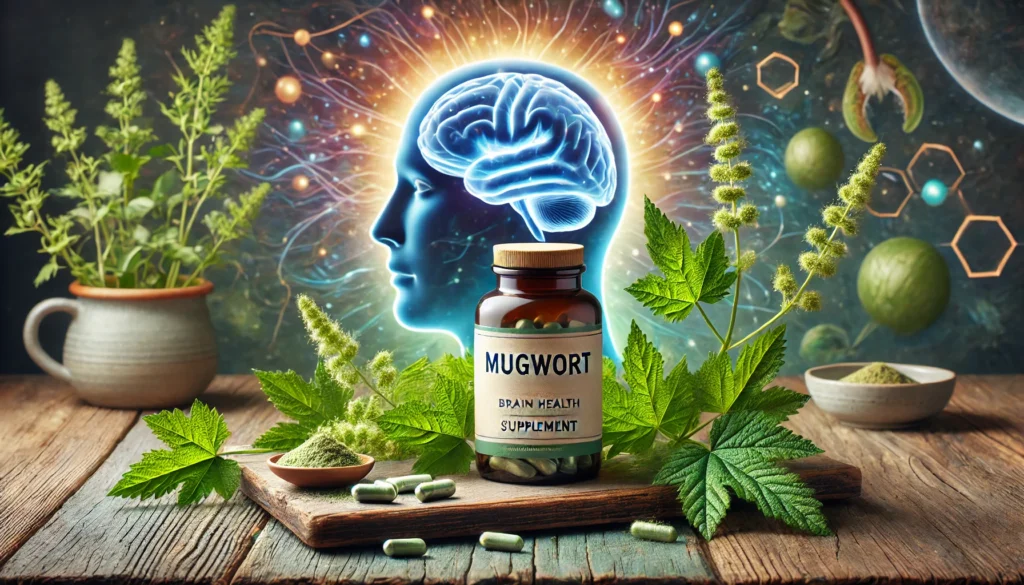Mugwort (Artemisia vulgaris) is a well-known herb in both traditional medicine and modern botanical practices. This aromatic plant, belonging to the Artemisia genus, has been used for centuries in various cultures, primarily for its digestive and medicinal properties. In recent years, however, Mugwort has gained attention as a potential nootropic—a class of substances designed to enhance cognitive function. This article will explore the nootropic potential of Mugwort, its active chemical constituents, how it works within the body and brain, its dosing guidelines, and potential side effects. Additionally, we will examine its interactions with other supplements and medications, as well as the safety concerns for individuals with specific health conditions.
You May Also Like:
Sources of Mugwort
Mugwort is native to Europe, Asia, and North America, and it thrives in temperate climates, often found growing along roadsides, in gardens, and in waste areas. Its common names include common mugwort, wormwood, and wild sage. Historically, the herb has been used for its diverse medicinal properties. Ancient Greeks and Romans used Mugwort for digestive issues, while Chinese medicine has utilized the plant for a range of conditions, including menstrual problems and anxiety.
The active ingredients in Mugwort are concentrated in its leaves and flowers, which contain essential oils, flavonoids, terpenes, and other bioactive compounds. These components are often extracted for use in supplements, teas, or tinctures. Despite its rich traditional usage, research into Mugwort’s nootropic effects is still in its early stages.
Mugwort enhances memory and supports cognitive clarity—Sharpen Your Mind, Shop Now on Amazon!

Chemistry of Mugwort
Mugwort’s nootropic potential can be attributed to the unique chemistry of its active compounds. The plant contains several key bioactive substances, including:
- Thujone: Thujone is perhaps the most well-known compound in Mugwort. It is a terpenoid, a type of organic compound commonly found in essential oils. Thujone has been shown to have both stimulating and calming effects on the nervous system. In small doses, it can enhance alertness, mental clarity, and cognitive function, but in larger doses, it can have toxic effects. The concentration of thujone in Mugwort is relatively low, making it safe for most individuals when used responsibly.
- Flavonoids: Mugwort contains various flavonoids, including apigenin, luteolin, and quercetin. These compounds possess antioxidant and anti-inflammatory properties, which help reduce oxidative stress and inflammation in the brain. By protecting neural cells from damage, flavonoids in Mugwort may offer neuroprotective benefits and contribute to cognitive longevity.
- Artemisinin: Artemisinin, another prominent compound found in Mugwort, is known for its potent anti-inflammatory and antioxidant properties. Although it is more widely recognized for its use in treating malaria, artemisinin may also help reduce neuroinflammation and oxidative damage in the brain, which can contribute to improved cognitive function.
- Caffeic Acid Derivatives: Mugwort contains caffeic acid derivatives, compounds known for their ability to modulate the central nervous system. These compounds are thought to influence dopamine and serotonin pathways, which could contribute to mood regulation and improved mental clarity.
- Essential Oils: The essential oils of Mugwort, including eucalyptol and camphor, are believed to contribute to the plant’s calming and stimulating effects on the central nervous system. These oils may also improve circulation and brain oxygenation, which could enhance cognitive performance.
Physiological Mechanisms of Mugwort in the Body and Brain
Mugwort’s nootropic effects likely stem from its ability to modulate neurotransmitter levels, reduce neuroinflammation, and protect the brain from oxidative stress. The following are some key physiological mechanisms that may contribute to its cognitive-enhancing effects:
- Neurotransmitter Modulation: The flavonoids and caffeic acid derivatives in Mugwort may help modulate levels of critical neurotransmitters such as dopamine, serotonin, and acetylcholine. Dopamine is involved in motivation, focus, and memory, while serotonin plays a key role in mood regulation. By influencing these neurotransmitters, Mugwort may help improve mood, focus, and cognitive performance, particularly under conditions of stress.
- Reduction of Neuroinflammation: Neuroinflammation is increasingly recognized as a significant contributor to cognitive decline and neurodegenerative diseases such as Alzheimer’s and Parkinson’s. The artemisinin and flavonoids in Mugwort have been shown to have anti-inflammatory effects, which could reduce neuroinflammation in the brain. By decreasing inflammation, Mugwort may help preserve cognitive function and protect against neurodegenerative diseases.
- Antioxidant Protection: Oxidative stress, caused by an imbalance between reactive oxygen species (ROS) and antioxidants, is a major factor in aging and cognitive decline. The antioxidants present in Mugwort, such as flavonoids and artemisinin, can help neutralize ROS and reduce oxidative damage to neurons. This neuroprotective effect may contribute to the long-term preservation of cognitive function.
- Enhanced Circulation and Oxygenation: The essential oils of Mugwort, particularly eucalyptol and camphor, may enhance blood circulation and oxygen delivery to the brain. Improved circulation could lead to better brain function, including increased mental clarity, focus, and memory retention.
- Modulation of Stress Response: Mugwort has been used traditionally as an adaptogen, a class of herbs that help the body adapt to stress. The herb’s compounds may support the body’s response to stress by balancing cortisol levels and promoting a calming effect on the nervous system. This calming effect could potentially improve cognitive function in high-stress environments.

Nootropic Benefits of Mugwort
Given its biochemical properties, Mugwort has potential as a nootropic supplement. Some of the proposed nootropic benefits of Mugwort include:
- Improved Cognitive Function: Through its effects on neurotransmitter regulation, particularly dopamine and serotonin, Mugwort may enhance cognitive performance by improving memory, focus, and mental clarity. Some users report heightened alertness and reduced mental fatigue when using Mugwort as a nootropic.
- Neuroprotection and Cognitive Longevity: The antioxidant and anti-inflammatory effects of Mugwort, particularly due to flavonoids and artemisinin, suggest potential neuroprotective benefits. By reducing oxidative stress and neuroinflammation, Mugwort could help protect the brain from age-related cognitive decline and neurodegenerative diseases.
- Mood Enhancement and Stress Reduction: Mugwort’s adaptogenic properties may help improve mood and alleviate symptoms of anxiety and depression. Its calming effects, along with its ability to regulate stress hormones, may help individuals manage stress and maintain mental clarity in stressful situations.
- Dream Enhancement: Mugwort has long been used in traditional medicine to promote vivid dreams and lucid dreaming. While this may not be a traditional nootropic benefit, the herb’s ability to influence the sleep cycle could indirectly enhance cognitive function by improving sleep quality. Better sleep is crucial for memory consolidation, learning, and overall brain health.

Dosage and Supplementation Guidelines
Mugwort supplements are available in various forms, including dried herb, capsules, tinctures, and teas. The appropriate dosage can depend on the form of the supplement and individual factors such as body weight, tolerance, and specific cognitive goals.
- General Dosage: A typical dosage of Mugwort as a nootropic ranges from 250 mg to 500 mg per day. This can be taken in capsule or tincture form. For tea, the recommended dosage is 1–2 teaspoons of dried Mugwort per cup of hot water, steeped for about 5–10 minutes.
- Lucid Dreaming Dosage: For those seeking to use Mugwort to enhance dreams, higher dosages may be required. A dose of 1–2 grams of dried Mugwort can be taken before bed. However, it is important to note that the effectiveness of Mugwort for dream enhancement varies from person to person.
- Supplement Forms: Mugwort supplements are available as capsules, tinctures, or dried herb. Standardized extracts are recommended for more consistent dosages, particularly for those seeking specific cognitive benefits.
- Starting Dose: When using Mugwort for nootropic purposes, it is recommended to start with a lower dose (e.g., 250 mg per day) and gradually increase as needed to assess tolerance.
Side Effects and Safety
While Mugwort is generally considered safe for most people, there are some potential side effects and safety considerations that should be noted:
- Gastrointestinal Upset: Some individuals may experience mild gastrointestinal discomfort, including nausea, bloating, or diarrhea, especially when taking large doses of Mugwort.
- Allergic Reactions: Mugwort is related to ragweed, and individuals with allergies to ragweed or other plants in the Asteraceae family may experience allergic reactions to Mugwort. Symptoms can include skin rashes, itching, or swelling, and those with allergies should avoid Mugwort or consult with a healthcare provider before using it.
- Sedative Effects: Mugwort’s calming effects on the nervous system may cause drowsiness in some individuals. It is advisable not to combine Mugwort with other sedative substances, including alcohol, benzodiazepines, or sleep medications.
- Potential Toxicity: While the thujone content in Mugwort is generally low, it can be toxic in high doses. Symptoms of thujone toxicity include seizures, confusion, and dizziness. Therefore, it is important to adhere to recommended dosages and avoid excessive use of Mugwort.
- Pregnancy and Breastfeeding: Mugwort should be avoided during pregnancy as it may have uterine-stimulating effects. It is also recommended to avoid using Mugwort while breastfeeding, as insufficient data is available on its safety for nursing infants.

Interactions with Other Supplements and Medications
Mugwort may interact with several medications and supplements. Some potential interactions include:
- Sedatives: Since Mugwort has calming effects, it may enhance the sedative effects of other substances, including benzodiazepines, barbiturates, and alcohol. Caution should be exercised when combining Mugwort with these substances.
- Antidepressants: Mugwort’s effects on serotonin levels may interact with selective serotonin reuptake inhibitors (SSRIs) or other antidepressants. This combination may increase the risk of serotonin syndrome, a potentially dangerous condition caused by excessive serotonin in the brain.
- Blood Pressure Medications: Mugwort may influence blood circulation and potentially lower blood pressure. Those taking medications for high blood pressure should monitor their blood pressure closely while using Mugwort.
Conclusion: Should You Consider Mugwort as a Nootropic?
Mugwort offers a range of potential cognitive benefits, from enhancing memory and focus to protecting the brain from oxidative stress and neuroinflammation. Its adaptogenic properties, ability to modulate neurotransmitters, and neuroprotective effects make it a promising candidate for improving cognitive function. However, further research is needed to fully understand its mechanisms and efficacy as a nootropic.
As with any supplement, it is important to approach Mugwort supplementation with caution. Individuals should start with lower doses, be mindful of potential side effects, and consult with a healthcare provider if they are taking medications or have pre-existing health conditions. Mugwort may prove to be a valuable addition to the nootropic arsenal, but like all supplements, it should be used responsibly and in moderation.

References:
- Health Benefits of Mugwort. Retrieved from: https://www.health.com/mugwort-7109946
- What Are the Benefits and Side Effects of Mugwort? Retrieved from: https://www.verywellhealth.com/mugwort-benefits-side-effects-dosage-and-interactions-4767226
- Mugwort: Possible Benefits and Other Health Effects. Retrieved from: https://www.healthline.com/health/mugwort-weed-with-potential
- Mugwort – Uses, Side Effects, and More. Retrieved from: https://www.webmd.com/vitamins/ai/ingredientmono-123/mugwort
- Alpha-thujone (the active component of absinthe): gamma-aminobutyric acid type A receptor modulation and metabolic detoxification. Retrieve from: https://pubmed.ncbi.nlm.nih.gov/10725394/
- Thujone inhibits the function of α7-nicotinic acetylcholine receptors and impairs nicotine-induced memory enhancement in one-trial passive avoidance paradigm. Retrieved from: https://pubmed.ncbi.nlm.nih.gov/28395994/
- Caffeic Acid Alleviates Memory and Hippocampal Neurogenesis Deficits in Aging Rats Induced by D-Galactose. Retrieved from: https://pmc.ncbi.nlm.nih.gov/articles/PMC9145046/
Important Note: The information contained in this article is for general informational purposes only, and should not be construed as health or medical advice, nor is it intended to diagnose, prevent, treat, or cure any disease or health condition. Before embarking on any diet, fitness regimen, or program of nutritional supplementation, it is advisable to consult your healthcare professional in order to determine its safety and probable efficacy in terms of your individual state of health.
Regarding Nutritional Supplements Or Other Non-Prescription Health Products: If any nutritional supplements or other non-prescription health products are mentioned in the foregoing article, any claims or statements made about them have not been evaluated by the U.S. Food and Drug Administration, and such nutritional supplements or other health products are not intended to diagnose, treat, cure, or prevent any disease.


